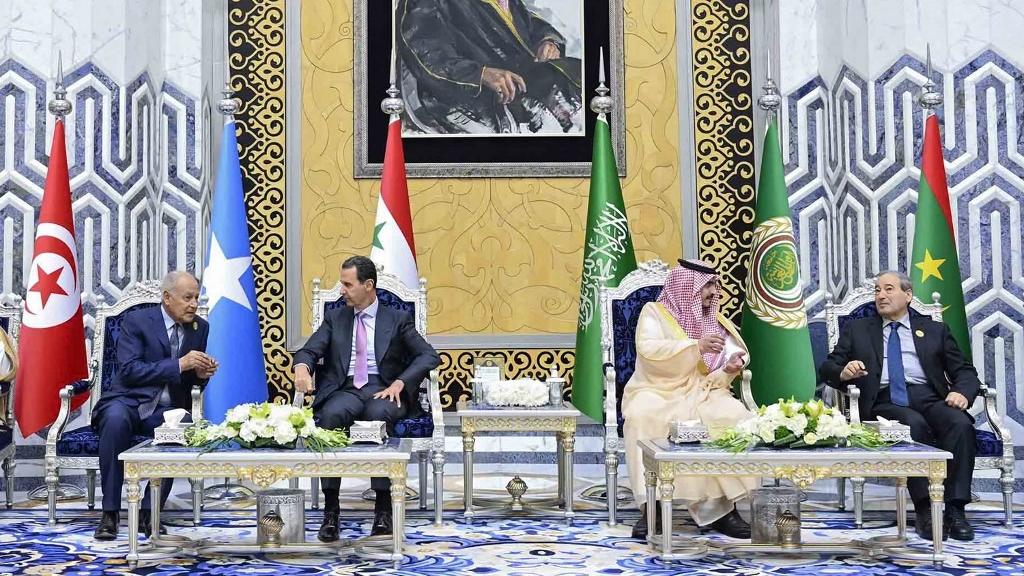 A handout picture released by the official Syrian Arab News Agency (SANA) shows Syria's President Bashar al-Assad (second left) speaking with Arab League Secretary-General Ahmed Aboul Gheit (left) while Foreign Minister Faisal Mekdad (right) speaks with the Deputy Emir of Mecca Prince Badr bin Sultan bin Abdulaziz (second right) ahead of the 32nd Arab League Summit in Jeddah on May 18, 2023. (PHOTO / SANA / AFP)
A handout picture released by the official Syrian Arab News Agency (SANA) shows Syria's President Bashar al-Assad (second left) speaking with Arab League Secretary-General Ahmed Aboul Gheit (left) while Foreign Minister Faisal Mekdad (right) speaks with the Deputy Emir of Mecca Prince Badr bin Sultan bin Abdulaziz (second right) ahead of the 32nd Arab League Summit in Jeddah on May 18, 2023. (PHOTO / SANA / AFP)
The Arab nations’ defiance of the United States’ objection to any efforts of theirs to normalize relations with Syria shows that US-led zero-sum tactics are no longer sustainable for a war-weary region, say analysts.
They also said that recent developments, such as a growing rapprochement in the Middle East and China's involvement in pushing for dialogues and trying to resolve Palestine's issues, indicate “a potential trajectory of change”.
At a joint press conference with visiting US Secretary of State Antony Blinken on June 8, Prince Faisal bin Farhan Al Saud, Saudi Arabia’s Minister of Foreign Affairs, said it was important to understand the context of the Arab League’s decision to normalize ties with Syria.
Syria was reinstated to the Arab League on May 7, ending more than a decade of isolation since 2011 over its handling of demonstrations in the country, which turned into a full civil war
“The context is that the status quo was not working and was generating an ever-increasing burden on countries of the region and on the people of Syria regardless of what one thinks of (Syrian President) Bashar al-Assad,” said Prince Faisal.
He reiterated that the only pathway to resolving the humanitarian challenges faced in the aftermath of the Syrian crisis was to find the pathways to addressing the issues and from the humanitarian perspective.
Syria was reinstated to the Arab League on May 7, ending more than a decade of isolation since 2011 over its handling of demonstrations in the country, which turned into a full civil war.
ALSO READ: Syria's Assad arrives to Saudi Arabia for Arab league summit
The main concerns now are “how do we ensure that there is safe pathway for refugees to return? How do we ensure that there is some political reconciliation? How do we address the issue of drugs? All of these things require a dialogue with Damascus,” said Prince Faisal.
The “other efforts that had been ongoing” have “showed no progress for many years” and only increased the difficulty of the situation, he added.
Prince Faisal also reiterated that Israeli “normalization was in the interest of the region” and “would bring significant benefits to all”, but without finding a pathway to peace for the Palestinian people, any normalization “will have limited benefits”.
At a press conference on June 9, Chinese Foreign Ministry Spokesperson Hua Chunying announced that at the invitation of Chinese President Xi Jinping, the President of the State of Palestine Mahmoud Abbas will pay a state visit to China from June 13 to 16.
Blinken was in Saudi Arabia from June 6 to 8 to meet with Saudi officials, including Saudi Crown Prince Mohammed bin Salman, to discuss US-Saudi cooperation, and participate in the US-Gulf Cooperation Council Ministerial meeting and the Global Coalition to Defeat ISIS.
ALSO READ: Region benefits from Syria scoring a win with Arab League
But the purpose of his visit was widely seen by analysts as an attempt to repair strained relations between Washington and Riyadh over previous disagreements between the two countries on issues like Iran, regional security, oil prices, and normalization with Syria.
Blinken has said that the US does not support normalization of any countries’ ties with Syria, but on the other hand, it supported all contributions by any country to advance peace in the region.
This was also the first visit of a top US official to the Gulf region, following the China-brokered resumption of diplomatic relations between Saudi Arabia and Iran in March.
Gokhan Ereli, Gulf Studies coordinator at the Center for Middle Eastern Studies, in Turkiye said the visit of Blinken to Saudi Arabia serves as “a tangible manifestation of the US’ ardent endeavor to rectify and mend the frayed fabric of bilateral relations”.
“Against the backdrop of mounting global inflationary pressures and the looming specter of recession in the Western world, the United States was compelled to approach Saudi Arabia willingly,” Ereli told China Daily.
READ MORE: Syria rejoins Arab League after 12-year absence
Also at the press conference, Prince Faisal said he “does not ascribe to a zero-sum game”, referring to Saudi Arabia’s respective relationship with Washington and Beijing.
“China is the world’s second-largest economy. China is our largest trading partner so naturally, there is a lot of interaction. China is an important partner for the Kingdom and most countries in the region,” said Prince Faisal, adding that cooperation is likely to grow as he expects China’s economic impact in the region and beyond is likely to grow.
Arhama Siddiqa, a Middle East analyst and research fellow at the Institute of Strategic Studies Islamabad in Pakistan, told China Daily that the Arab states, faced with various challenges like the pandemic, oil disputes, and the Russia-Ukraine standoff, now prioritize their own economic visions.


